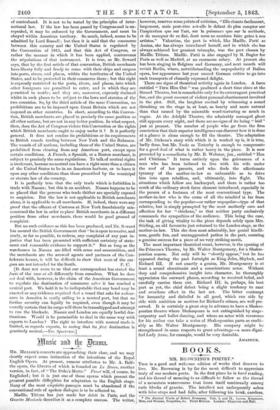Mint a.01 tljt raum.
Mn. MELLox's concerts are approaching their close, and we may shortly expect some intimation of the intentions of the Royal English Opera. At present, rumour attributes to Mr. A. Balfe the opera, the libretto of which is founded on Le Bossu, another version, in fact, of "The Duke's Motto." Faust will, of course, be Englished ; but it is just one of those operas which present the greatest possible difficlaties for adaptation to the English stage. Many of the most exquisite passages must be abandoned if the conventional rule of spoken dialogue is to be adhered to.
Madlle. Titiens has just made her deb& in Paris, and the Gazelle Musicale describes it as a complete success. The writer,
however, reserves some points of criticism, "Elle chante facilement, largement, mais peut-titre a-t-elle le defaut de plus compter stir l'inspiration que stir Part, stir In puissance que stir la methode, et de manquer de ce fini, dont nous ne saurions faire grace h nos artistes." Valentine, the part in which, like Madlle. Patti as Amina, she has always introduced herself, and in which she has always achieved her greatest triumphs, was the part chosen by Madlle. Titiens. Madlle. Patti is also engaged by M. Bagier for Paris as well as Madrid, at an enormous salary. At present she has been singing in Belgium and Germany, and next month will revisit Berlin, where, notwithstanding the unpopularity of Italian opera, her appearance last year caused German critics to go into such transports of clumsily expressed delight.
There are signs of theatrical activity again in London. A farce entitled " Turn Him Out " was produced a short time since at the Strand Theatre, but is remarkable only for its extravagant practical fun, and the great amount of violent personal chastisement involved in the plot. Still, the laughter excited by witnessing a sound thrashing on the stage is, at least, as hearty and more natural than that caused by the miserable word-torturing so much in vogue. At the Adelphi Theatre, the admirably managed ghost still appears every night, and there are no signs of its being " laid " just at present. The number of people who go from the firm conviction that their superior intelligence can discover how it is done at a glance is alone enough to fill the theatre. The adaptation of Mr. Dickens's story with which it is worked up is, it is true, badly done, but Mr. Toole as Tetterby is enough to compensate for a good deal of what is rather heavy in the piece. It is now preceded by a comedietta by Mr. B. Webster, jun., entitled " Hen and Chickens." It turns entirely upon the grievances of a man who has been induced to live with his wife under the roof of her parents, and who finds the affectionate tyranny of the mother-in-law so unbearable as to drive him into open rebellion, and, ultimately, into flight. The situations which follow are hackneyed, and there is rather too much of the ordinary stock farce element introduced, especially in the person of a footman of the most conventional type. The mother-in-law who is the cause of all the mischief is far from corresponding to the popular—or rather unpopular—type of that relative, but is simply prompted by the most motherly care and affection for her " chickens," so that neither party exclusively commands the sympathies of the audience. This being the case, the task of giving vitality to the piece depends solely upon Mrs. Stirling, an old favourite just returned to the London stage, as the mother-in-law. This she does most admirably, her genial kindli- ness, gentle fun, and unexaggerated pathos in the part, ensuring a genuine success for a piece of no very striking merit.
The most important theatrical event, however, is the opening of the Princess's Theatre, by Mr. Walter Montgomery, for a Shakes- pearian season. Not only will he "shortly appear," but he has appeared during the past fortnight as King John, Shylock, and Richard III. If not exactly a genius, Mr. Montgomery is at least a sound elocutionist and a conscientious actor. Without deep and comprehensive insight into character, he thoroughly appreciates the outward phases, according to received belief, and carefully carries them out. Richard III. is, perhaps, his best part as yet, the chief defect being a slight tendency to rant and overdone effort in the last act. The bitter contempt for humanity and disbelief in all good, which run side by side with ambition as motives for Richard's crimes, are well pre- served. It is certainly a great step in advance to have a Shakes- pearian theatre where Shakespeare is not extinguished by stage- carpentry and ballet-dancing, and where an actor with reverence for his author can take a series of Shakespearian parts as credit- ably as Mr. Walter Montgomery. His company might be strengthened in some respects to great advantage—a more digni- fied Lady Anne, for example, would be very desirable.
AMATEUR.






























 Previous page
Previous page